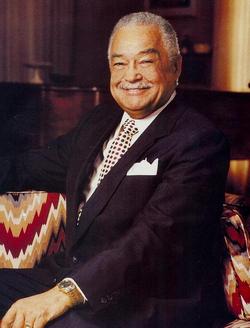Get Today in Masonic History into your Inbox. Sign up today for one of our email lists!
Need an article for your Trestleboard/Newsletter see our Use Policy
Coleman Alexander Young is Born

Today in Masonic History Coleman Alexander Young is born in 1918.
Coleman Alexander Young was an American politician.
Young was born in Tuscaloosa, Alabama on May 24th, 1918. In 1923 his family moved to Detroit, Michigan. He graduated from Eastern High School in 1935. After graduating he went to work for the Ford Motor Company. He was blacklisted from the company after they found he was involved in the union and with civil rights activism. He later went on to work for the United States Post Office Department (the predecessor to the United States Postal Service). Young and his brother George started the Postal Workers Union.
During World War II, Young served in the 477th Medium-Bomber Group (Tuskegee Airman) in the United States Army Air Forces as a bombardier and navigator. He was also involved with the Freeman Field Mutiny. An incident which occurred in 1945 in Indiana. A group of African-American officers were arrested for resisting segregation on the base.
In the late 1952, Young, it could be said, first came on to the national stage. This occurred when he was called before the House Committee on Un-American Activities (HUAC) when he was accused of being a member of the communist party. His being called before the committee most likely, as it did with others called before HUAC, to do with his other activities at the time. Starting in the late 1940's, he was part of the Progressive Party, supporting Henry A. Wallace for president, he fought against racism in the United Auto Workers and he was a member of National Negro Labor Council. His association with these organizations as well as fighting segregation in the Army brought him to the attention of the HUAC.
It was at Young's appearance before the HUAC where his "tell it like it is" style truly shone through. He refused to answer questions about whether he was a member of the communist party. Instead he used the opportunity to call out members of the committee and attack the inequalities in the voting laws against southern blacks. On this subject he notably said to the Congressman from Georgia "I happen to know, in Georgia, Negro people are prevented from voting by virtue of terror, intimidation and lynchings. It is my contention you would not be in Congress today if it were not for the legal restrictions on voting on the part of my people."
Through the rest of the 1950's and in the 1960's Young grew his political base in Michigan. In 1960 he was elected as a delegate to help draft a new state constitution for Michigan. In 1964, he was elected to the Michigan State Senate. The most significant legislation was a law requiring arbitration in disputes between public-sector unions and municipalities.
In 1973, Young campaigned and won the election to become the Mayor of Detroit. His main focus was the disproportionate nature of the Detroit Police Department. In 1974, the Detroit Police Department was 10% black while the population of Detroit was just under 50% black. He was also focused on getting rid of a special task force called STRESS (Stop the Robberies and Enjoy Safe Streets). In the two and a half years in operated, STRESS was accused of killing 22 residents and arresting hundreds more without cause. STRESS was actually suspended prior to Young taking office by his predecessor, although Young completely disbanded the unit on taking office. By the time Young left office in 1993, the number of black officers in the Detroit Police Department had grown to more than 50% of the force.
Of the overall crime issues of Detroit, Young was quoted as saying "I issue a warning to all those pushers, to all rip-off artists, to all muggers: It’s time to leave Detroit; hit Eight Mile Road! And I don’t give a damn if they are black or white, or if they wear Superfly suits or blue uniforms with silver badges. Hit the road." It is also the overall crime issues of Detroit where he gets most of his criticism. Despite crime decreasing in some categories, in the category of criminal gangs, many critics point to the fact the 1970's and 1980's Detroit criminal organization controlled the drug trade.
One of the other areas Young was able to address successfully was the annual tradition of "Devil's Night." When Young took office, Detroit had become synonymous with the arson and mayhem associated with the night. Every year on October 30th, Detroit was set on fire with the violence which marked the day. Using community policing and enlisting the help of, at times, 30,000 citizens of Detroit, they were able to help reduced the violence of the day. Successors to the office of Mayor of Detroit have continued these programs with on going success.
Young clearly had a tell it like it is style in all he did. It has been also noted he often used profanity. On the subject of profanity, Young once said "Swearing is an art form. You can express yourself much more exactly, much more succinctly, with properly used curse words."
Young passed away on November 29th, 1997 from emphysema.
Young was a member of Abiff Lodge No. 21 in Detroit, Michigan. He was a member of Wolverine Consistory Ancient Accepted Scottish Rite, Prince Hall Affiliation (AASR, PHA) and a member of Maracci Temple No. 13 the Ancient Egyptian Arabic Order Nobles Mystic Shrine (AEAONMS).
This article provided by Brother Eric C. Steele.

